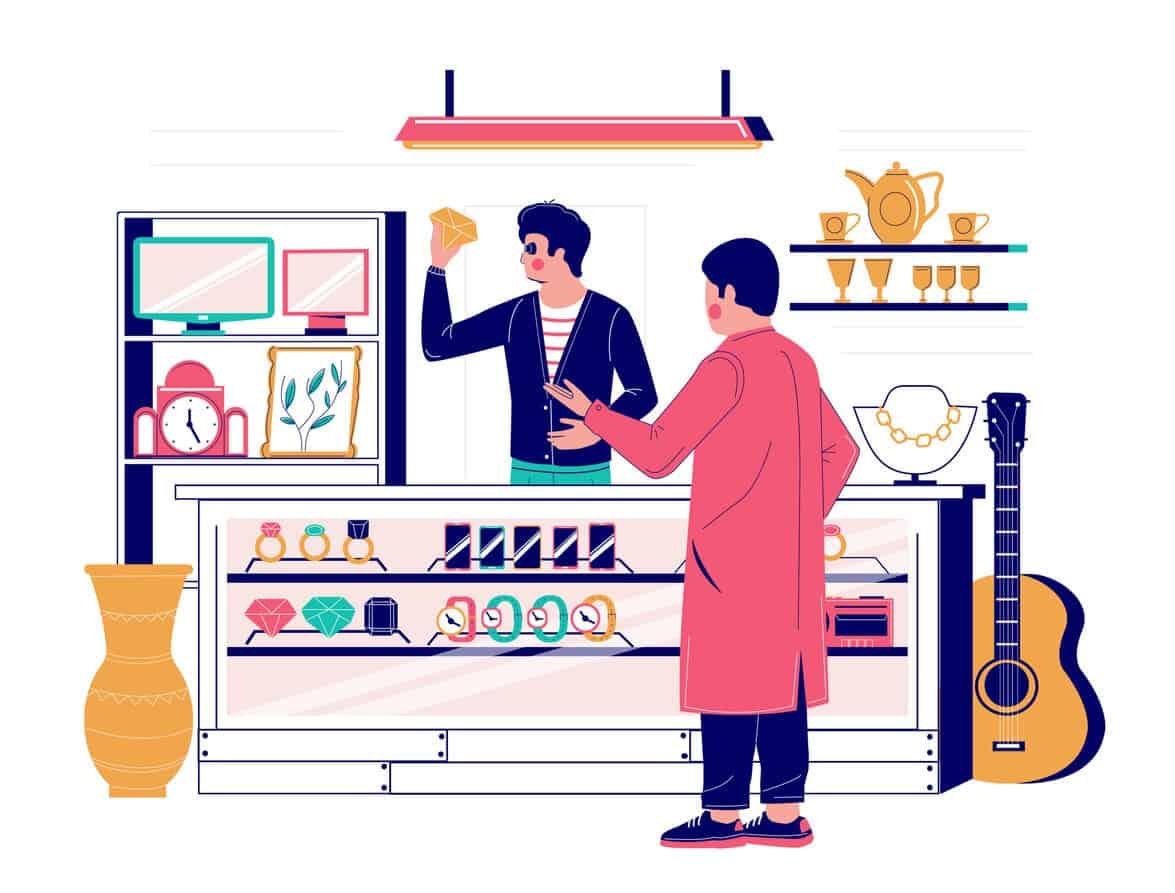While most people are familiar with the concept of selling items, few are familiar with the definition of pawning. The distribution of pawnshops within a country varies between each country; some countries have pawn shops around every corner while others do not have any.
Upon reading the following article, you will have a better understanding of both pawning and selling. You will also be able to differentiate between them and assess the situations in which one is better than the other.
What Is Pawning? What Is Selling?
Selling an item to someone means that you are giving them an item you own in exchange for a specific sum of money. Selling involves a change of ownership: once an item is sold, it can no longer belong to its previous owner unless he or she buys it back.
Pawning an item is normally done when a person owes another person money, so the former deposits a valuable item (usually of greater value than the amount of money owed) until he or she is able to pay the other person back. Pawning has something similar to a due date, called the redemption period, after which the person in possession of the item can sell it in exchange for the debt that remained unpaid.
The difference between the two is that selling can take place at anytime and with no prior conditions, while pawning is only done when a person is in debt. Selling is usually a matter of choice (“usually” because sometimes, people are forced to sell some of their things because they need the money, but that is not as frequent as selling willingly) while pawning is something one is forced to do in order to pay back a loan or other forms of debt.
How Do Pawn Shops Work?
When someone needs a loan, they do not need to sell their ownings – only, sort of, rent them. A pawn shop is a medium through which money is lent or collected and valuables are deposited or retained. Why is it profitable for people to own pawn shops? There are two main reasons.
First, interest. Just as a bank loan, pawn loans have specific interest and that goes right into the pocket of the pawnshop owner. Second, even better than interest, the owner sets the amount of money to loan for a certain item (the criteria based on which this value is determined will be discussed later. Why is this a good thing?
Say you have a watch worth $2,000. In need of money, you might accept to pawn it for $1,700. If you can get the money back in time and pay back your debt, the store owner only benefits from interest.
However, his or her luckier day would come if the redemption period has passed and you have not yet paid back your debt. In that case, the owner now has the right to sell the watch, and could sell it for $1,800, $1,900, or even $2,500! This number minus that he paid for the watch will constitute pure profit for him or her.
Here is the procedure that a pawn shop transaction goes through in technical terms. The pawnshop offers a collateral-based loan, collateral being the item kept by the pawnbroker until loan repayment.
The pawnbroker gives you money and a pawn ticket with the details of the transaction. Now there is a redemption period during which the individual can pay back the balance owed and retrieve his or her collateral.
Once that period is done, the individual either keeps the money he got as a loan in return for the pawnshop keeping the item, or the two agree on an extension with additional costs incurred.
If there is no extension, the item is now owned by the pawnbroker who is free to keep it or sell it to generate profit.
Which Is More Profitable, Pawning Items or Selling Them?
From the pawn broker’s perspective, while some do accept to outright buy used items to sell them for more later, they normally prefer pawning as it generates much more profit due to interest or the possibility of selling the valuables for their personally-set price. Interestingly, people who pawn their items can also profit from it.
Other than jewelry, most of the valuables a person owns are not used every day, at least to me it is like that: the valuables I own are either displayed in my house or stashed in a drawer I open once per year.
When I pawn such items, I am not “losing” anything, as I will be able to retrieve them later.
However, I am gaining money! Now this money can be invested; as the proverb goes, “Money makes money”. Therefore, I am able to get the money I need out of thin air; once I am done with it, I end up with whatever I needed the loan for and with all my valuables.
Is it Better to Pawn Gold or Sell It? How About Jewelry?
Gold is an asset whose price is always known to the public. Therefore, if you are looking at how much you will be able to get for a fixed amount of gold you have, it will be the same if you pawn it or sell it to a jeweler.
Gold is influenced by a lot of factors, including politics and the supply-demand chain. During Valentine’s period for example, gold prices tend to go up as lovers gift each other gold.
It is important to make sure how pure your gold is (how many karats). While a jeweler would not trick you when buying your gold, a pawn breaker might. Normally, gold has high value and is less easily spent than money, so if you are in need of some cash, consider pawning your gold instead of selling it – that way, you will still possess something of high worth at the end of the day.
When it comes to authentic jewelry, it is usually a good idea to pawn them. Pawnbrokers understand the timelessness of diamonds and gold, and are therefore likely to loan you more money when you pawn such items, as compared to pawning an antique wooden clock or some other item whose value is not constant.
As for other types of jewelry, they might become outdated if you pawn them for long; unlike gold, other jewelry like faux bijoux (fake accessories) are guaranteed to lose their value. Therefore, it might be better to sell them before they lose their worth!
What Are the Criteria Based on Which Pawn Shops Determine the Value of an Item?
As previously mentioned, pawnbrokers look for items that do not lose value over time, which makes sense.
A pawn shop is a business after all, and the owner definitely wants to avoid buying an item for less than they will be able to sell it. Pawnbrokers are also very strict when it comes to making sure the property you are pawning is actually yours.
As for interest, laws vary in different regions about how high an interest rate can go. While a higher interest rate means higher profit for the pawnbroker, an interest rate that is too high would push customers towards selling their items or pawning at competitor stores.
Overall, pawning is a mutualistic benefit, as is selling. Each has its own pros and cons, and one should be very well-informed about his or her items before deciding whether to pawn or sell!
Disclaimer: This website is not a registered investment, legal or tax advisor, or a broker or dealer. All opinions found in this article simply convey the opinions of the author and website owner formulated through research and personal analysis. There is room for unintended errors, despite all information being delivered with effort of accuracy and legitimacy.



